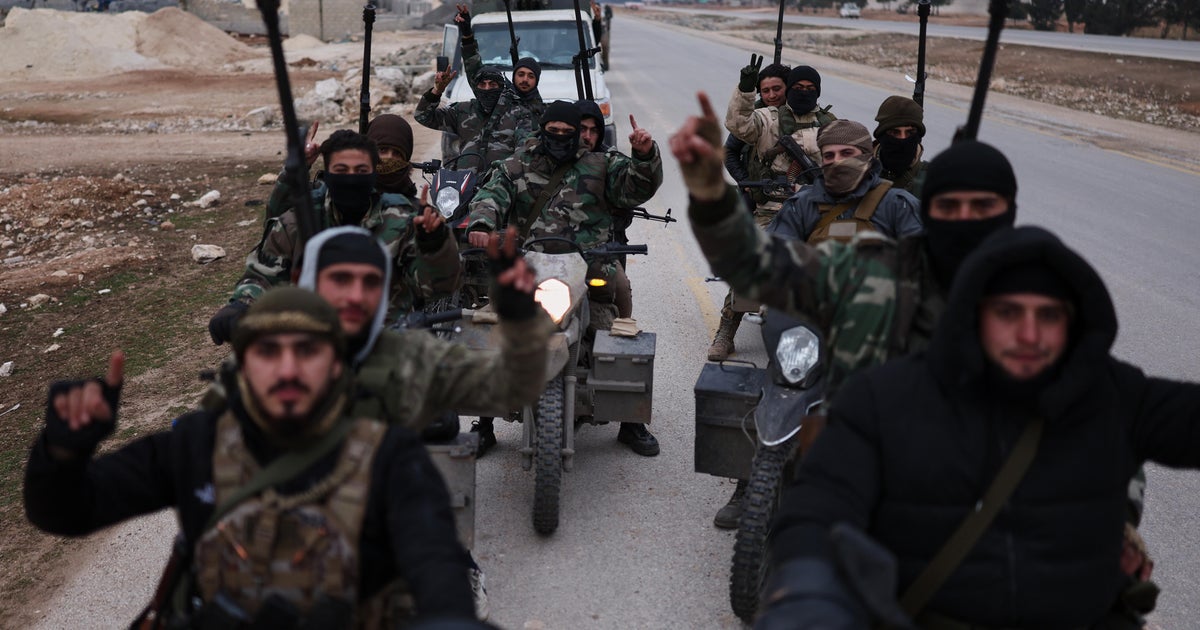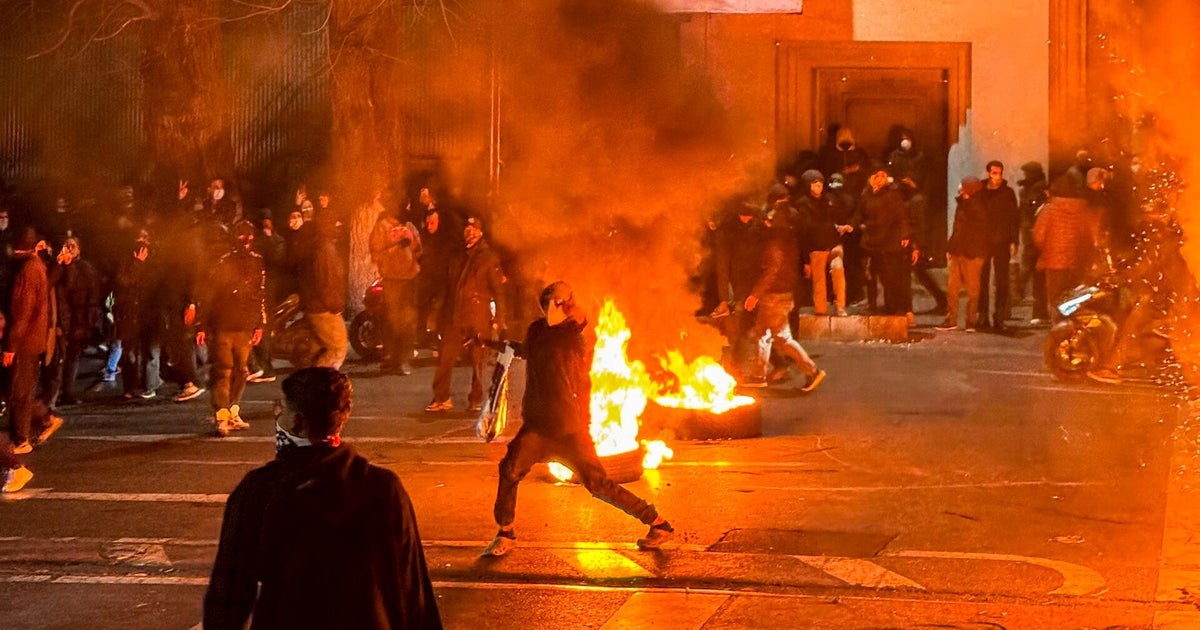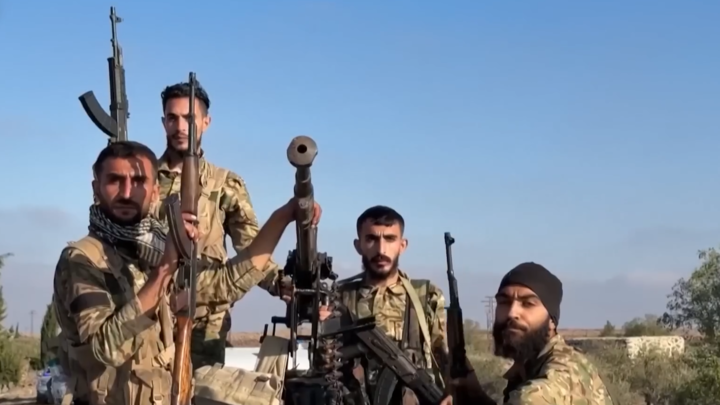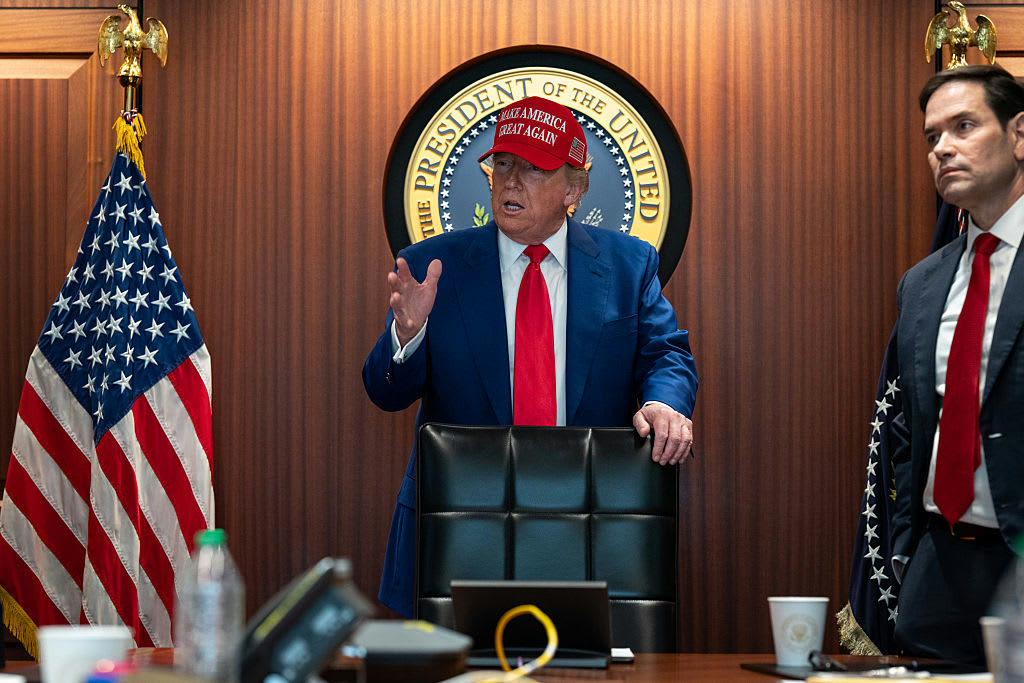Syrians take to the streets of Damascus in defiance after airstrikes
DAMASCUS, Syria -- Hundreds of Syrians gathered at landmark squares in the Syrian capital Saturday, honking their car horns, flashing victory signs and waving Syrian flags in scenes of defiance that followed unprecedented joint airstrikes by the United States, France and Britain. A few hours earlier, before sunrise, loud explosions jolted Damascus and the sky turned orange as Syrian air defense units fired surface-to-air missiles in response to three waves of military strikes meant to punish President Bashar Assad for his alleged use of chemical weapons.
CBS News' Seth Doane reports it was a sleepless night in the capital city as coalition airstrikes lit up the sky. At a bakery Saturday, one woman described how her house shook and what she heard. "I couldn't tell what was going on," she said. "I saw the flames, and the fire."
From a distance, U.S. missiles hitting suburbs of the capital sounded like thunder. Shortly after the one-hour attack ended, vehicles with loudspeakers roamed the streets of Damascus blaring nationalist songs.
"Good souls will not be humiliated," Syria's presidency tweeted after the airstrikes began.
The Pentagon said Saturday morning the U.S.-led airstrikes on Syria "successfully hit every target," and described them as "precise, overwhelming and effective."
The U.N. Security Council planned to meet later Saturday at Moscow's request. NATO representatives planned a special session to hear from U.S., British and French officials.
The military strikes
President Trump announced Friday night the U.S. launched "precision" military strikes against targets inside Syria linked to recent chemical attacks -- a culmination of days of threats by Mr. Trump against the Syrian government over a suspected chemical attack against civilians in Douma last weekend that killed more than 40 people. The Syrian government has repeatedly denied any use of banned weapons.
"A short time ago, I ordered the U.S. Armed Forces to launch precision strikes on targets associated with the chemical weapons capabilities of Syrian dictator, Bashar al-Assad," the president said from the White House. "A combined operation with the armed forces of France and the United Kingdom is now underway."
Lt. Gen. Kenneth McKenzie, the director of the Joint Staff at the Pentagon, said Saturday that 105 weapons were launched against three targets in Syria. Characterizing the strike as a success, he said, "As of right now we're not aware of any civilian casualties."
Chief Pentagon spokeswoman Dana White said the strikes were launched to "cripple Syria's ability to use chemical weapons in the future." White said the strikes do not "represent a change in U.S. policy or an attempt to depose the Syrian regime." But she said, "We cannot allow such grievous violations of international law."
She also called on Russia to "honor its commitment" to ensure the Assad regime gives up chemical weapons.
At about sunrise, the sound of explosions could be heard just as the loudspeakers from the city's mosques called for morning prayers. Syrians said they were jolted awake around 4 a.m., when the attack began, with missiles hitting the eastern suburbs of Damascus, shaking the grounds from a distance. The sky looked orange over eastern Damascus, apparently as a result of fires. Air defense units fired surface-to-air missiles from different directions toward incoming missiles.
A car with loudspeakers blaring the national song "Oh Syria, You Are My Love" could be heard driving through central Damascus during the attack.
U.S. Defense Secretary James Mattis called it "a one-time shot," but did not rule out further attacks. He said there were no reports of U.S. losses during the initial airstrikes, which he said were launched against several sites that helped provide Assad's ability to create chemical weapons.
France's foreign minister said the "chemical escalation" in Syria is not acceptable because it violated the rules of war and of humanity. Jean-Yves Le Drian told reporters Saturday that the joint military operation in Syria is legitimate, limited and proportionate.
British Prime Minister Theresa May described the attack as neither "about intervening in a civil war" nor "about regime change" but a limited and targeted strike that "does not further escalate tensions in the region" and does everything possible to prevent civilian casualties.
Mr. Trump chastised Syria's two main allies, Russia and Iran, for their roles in supporting "murderous dictators," and noted that Russian President Vladimir Putin had guaranteed a 2013 international agreement for Assad to get rid of all of his chemical weapons. He called on Moscow to change course and join the West in seeking a more responsible regime in Damascus.
On Saturday morning, Mr. Trump tweeted: "A perfectly executed strike last night. Thank you to France and the United Kingdom for their wisdom and the power of their fine Military. Could not have had a better result."
"Mission Accomplished!" he added.
The targets
Pentagon officials said the attacks, carried out by manned aircraft and from ships that launched cruise missiles from the Mediterranean Sea, targeted the heart of Assad's programs to develop and produce chemical weapons, and delivered "a very serious blow," said McKenzie.
Chairman of the Joint Chiefs Gen. Joseph Dunford said in a news conference Friday that the three target areas included a scientific research center located in Damascus, a chemical weapons storage facility west of Homs and a nearby storage facility with chemical weapons equipment and an "important" command post.
Dunford said the research center was used for development, production and testing of chemical and biological warfare technology. He explained the facility in Homs was the primary location of Syrian sarin and precursor production equipment
After the attack
Immediately after the attack, hundreds of residents gathered in Damascus' landmark Omayyad square, celebrating what they said was the army's success in shooting down or derailing some of the missiles. Many waved Syrian, Russian and Iranian flags. Some clapped their hands and danced, others drove in convoys, honking their horns in defiance.
"We are not scared of America's missiles. We humiliated their missiles," said Mahmoud Ibrahim, half his body hanging outside his car window, waving a Syrian flag. The crowd then moved toward the nearby Damascus University where pro-government fighters danced, waving their automatic rifles over their heads.
A fact-finding team of inspectors from the international chemical weapons watchdog was in Damascus Saturday. The Organisation for the Prohibition of Chemical Weapons (OPCW) said in a statement the team will continue its deployment "to establish facts around the allegations of chemical weapons use in Douma."
Response to Syria strikes
Russia called an emergency U.N. Security Council meeting for Saturday morning in response to the airstrikes, CBS News' Pamela Falk reports from the U.N. The country said the strikes were a violation of the U.N. Charter and International law, Falk reports, and called the strikes "an act of aggression." Russia warned that the airstrikes will "not be left without consequences." It said that "all responsibility" rests with Washington, London and Paris.
The Russian military said Syria's Soviet-made air defense systems downed 71 out of 103 cruise missiles launched by the United States and its allies, but the Pentagon later said none of the missiles fired by the U.S. and its allies was deflected by Syrian air defenses, rebutting claims by the Russian and Syrian governments.
"None of our aircraft or missiles involved in this operation were successfully engaged by Syrian air defenses," Lt. Gen. Kenneth McKenzie, the director of the Joint Staff at the Pentagon, said Saturday. He said there was no indication that Russian air defense systems were employed early Saturday in Syria.
Syrian TV called the attacks a "blatant violation of international law and shows contempt for international legitimacy."
A Syrian statement read by Brig. Gen. Ali Mayhoub said three civilians were wounded in one of the strikes on a military base in Homs, although the attack was aborted by derailing the incoming missile. He said another attack with "a number of missiles" targeting a scientific research center in Barzeh, near Damascus, destroyed a building and caused other material damage but no human losses. Mayhoub said the building housed an educational center and labs.
Iran's Supreme Leader Ayatollah Ali Khamenei said that the attack on Syria was a "crime" and declared the leaders of the U.S., France and the U.K. "criminals," according to Iran's state-run IRNA news agency. The Iranian Foreign Ministry strongly condemned the strikes and warned of unspecified consequences.
The seemingly limited strikes, with no apparent future strategy for how to deal with the wider civil war, was a cause for relief and celebration by Assad supporters, but criticized by the Syrian opposition. Mohammad Alloush, spokesman for the Army of Islam rebel group, called the airstrikes a "farce" in a Twitter posting. Nasr al-Hariri, a senior opposition leader, said Syrians need a strategy that leads to a political solution to "save it from the brutality of the Syrian regime."
Al-Hariri, in a tweet, suggested the strikes send the wrong message that while it is not OK to use chemical weapons, the Syrian government can continue to "use explosive barrels and cluster bombs."
Trump's second order to attack Syria
The decision to strike, after days of deliberations, marked Mr. Trump's second order to attack Syria; he authorized a barrage of Tomahawk cruise missiles to hit a single Syrian airfield in April 2017 in retaliation for Assad's use of sarin gas against civilians.
That missile strike was meant to deter Assad from further use of chemical weapons, and the operation targeted the airfield from which the Syrian aircraft had launched their gas attack.
But the damage was limited, and a defiant Assad returned to episodic use of chlorine and perhaps other chemicals.
Friday's strikes were aimed to degrade his ability to carry out further such attacks.
Mr. Trump said Washington is prepared to "sustain" pressure on Assad until he ends what the president called a criminal pattern of killing his own people with internationally banned chemical weapons.





